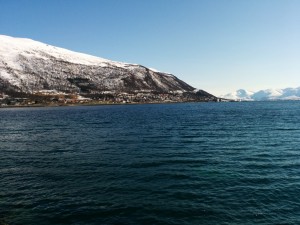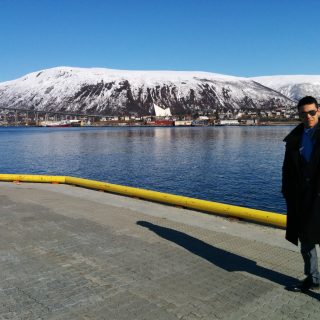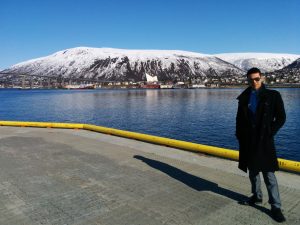During my GDL, I was lucky enough to be invited to ‘Cooperation 66 North‘, a conference in Tromso, Norway (at the world’s northernmost university). While some people on the course would say I’m mad for taking a week out during study leave – the jury is still out on that – I met a lot of very interesting people, and learned a lot about the legal, political and security challenges facing the Arctic region. City University was generous enough to pay for the conference package, while I funded my flights and accommodation. The fact that Tromso is a beautiful city certainly helped take my mind off of exams!
The conference focused on multi-national cooperation in the Arctic region – mainly between the USA, Russia, Norway, Denmark, Canada, Finland, Sweden and Iceland. These countries are in the Arctic Council, an intergovernmental forum for Arctic discussion located in Tromso.
I attended with an eye to learning more about the legal regional challenges. The conference focused heavily on the Northern Sea Route (NSR), a lucrative shipping route crossing the top of Russia from the Bering Strait, which is becoming steadily more accessible every year due to climate change. Some of the legal issues included coordination of intergovernmental agencies to pool information (e.g. seismic monitoring, ice coverage, weather, fishing stocks), setting up funding for icebreakers and Search & Rescue (SAR), as well as trying to organise a single legal framework to govern shipping and trade in the region.
This final point – the single legal framework – is being developed as the “Polar Code”. The International Maritime Organisation (IMO) is debating it, but its development has dragged on for years. This legal tangle could have potentially severe consequences if left unresolved. To take one example given, the NSR is becoming increasingly attractive for foreign investment, and not all flag states (the state under which a ship is registered) have adequate safety protocols or insurance policies. An accident in the region would be catastrophic – for example, a chemical or oil spill would spread into multiple legal national jurisdictions, and a tourist ship would be very difficult to rescue (survival time in the water is 30 seconds or less, some speakers argued you can’t be saved once you fall in). It would be even worse if, in lieu of a binding international legal regime, the perpetrator of an accident could limit or walk away from liability leaving the countries ultimately effected to foot the bill.

Beyond the Polar Code, there are also legal debates over two other regional issues – the “doughnut hole” and claims on the Continental Shelf. The “doughnut hole” is a 2.8 million km2 region historically covered in sea ice, which is quickly melting. However, the current laws on Exclusive Economic Zones (EEZs) in oceans leave this vast area essentially unowned, and leave it up to states to negotiate between themselves. Developments in modern commercial fishing mean this area is easily exploitable – and historically disputes over fisheries have been extremely hot topics, meaning a legal framework to decide who owns it will become crucial. Beyond the economics, there is a serious risk of ecological damage should fishing be uncontrolled by law.
The concept of a Continental Shelf is essentially the area of seabed next to a country which belongs to that country. This seems uncontentious, but the legal definition of a shelf is not the same as a geological one, and these sections of land contain immense hydrocarbon resources. Currently there are multiple “claims” being staked on various sections of seabed by Russia and the USA, and remarkably these processes are currently being resolved through established and respected legal channels. It was clear to me that ensuring everyone uses the same legal methods to resolve disputes is crucial when dealing with the quantity and value of the potential resources at stake in the Arctic, and the continental shelf claims were a sterling example of this.
What struck me during the talks was that all the issues mostly came down to the law – or rather a lack of the law. Whether it was setting up Russian SAR zones (what does the law say about who benefits from them and who foots the bill?), or controlling the influx of foreign money (can you legally block, say, Chinese ships from entering the NSR if they pay Russia, but have to pass by the Bering Strait?), it was usually a legal question first, then a question of finance and practicality second.
To conclude this whistle-stop tour of Cooperation 66, the Arctic is a region which is opening up economically, legally and physically. As the world’s climate changes, this beautiful, resource-rich and very vulnerable region needs to be carefully managed. What I took from the conference, among other things, is that the lawyers of today and the future (hopefully City graduates!) will be vital in laying the foundations to ensure stable development and growth in the region.
Thanks to Alex Flather for writing up his experiences at the Cooperation 66 North conference – Alex graduated from his GDL at City in June 2014.


